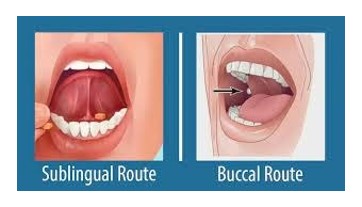A nurse is caring for a client who has difficulty swallowing medications and is prescribed enteric-coated aspirin PO once daily. The client asks if the medication can be crushed to make it easier to swallow. Which of the following responses should the nurse provide?
Crushing the medication would release all the medication at once, rather than over time.
Crushing the medication is a good idea and I can mix it in some soft cream for you.
Crushing the medication might cause you to have stomach-ache or indigestion.
Crushing is unsafe as it destroys the ingredients in the medication.
The Correct Answer is C
Enteric-coated aspirin is designed to release slowly over time to protect the stomach lining from irritation. Crushing the medication would defeat this purpose and could cause stomach irritation or other side effects.
Nursing Test Bank
Naxlex Comprehensive Predictor Exams
Related Questions
Correct Answer is C
Explanation
Sublingual and buccal medications are rapidly absorbed because they are placed under the tongue or between the cheek and gum, where they dissolve and are absorbed directly into the bloodstream through the mucous membranes in the mouth. This allows for rapid absorption and bypasses the liver’s first-pass metabolism.

Correct Answer is C
Explanation
A.Cephalexin oral suspension should typically be stored in the refrigerator to maintain its stability and effectiveness. Storing it at room temperature could affect its potency.
B.Shaking the oral suspension is necessary to ensure the medication is evenly distributed before each dose, providing the client with the correct dosage of active ingredients. Failure to shake the suspension can result in uneven dosing.
C.Cephalexin is a cephalosporin antibiotic, and there is a potential for cross-sensitivity in clients who are allergic to penicillin. Up to 10% of people with a penicillin allergy may also be allergic to cephalosporins. Checking for a penicillin allergy helps prevent an adverse reaction, making it a critical safety measure before administering cephalexin.
D.While some antibiotics can cause gastrointestinal side effects, constipation is not a common adverse effect associated with cephalexin. The nurse should instead monitor for other side effects like diarrhea, which is more typical with antibiotics and can indicate a mild side effect or a more severe condition, such as Clostridioides difficile infection.
Whether you are a student looking to ace your exams or a practicing nurse seeking to enhance your expertise , our nursing education contents will empower you with the confidence and competence to make a difference in the lives of patients and become a respected leader in the healthcare field.
Visit Naxlex, invest in your future and unlock endless possibilities with our unparalleled nursing education contents today
Report Wrong Answer on the Current Question
Do you disagree with the answer? If yes, what is your expected answer? Explain.
Kindly be descriptive with the issue you are facing.
